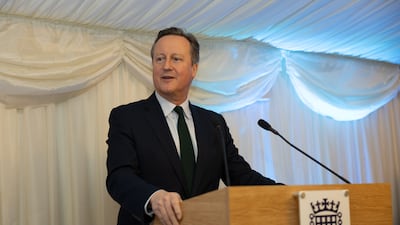Live updates: Follow the latest news on Israel-Gaza
David Cameron called for the establishment of a diplomatic campaign by “all the friends of a Palestinian state” as he embarked on a regional tour as part of a drive to make a two-state solution irreversible.
In a speech to Arab ambassadors in London, Lord Cameron said the UK and its allies would look at recognising a Palestinian state at the UN.
”We with allies will look at the issue of recognising a Palestinian state including at the United Nations," he said at the reception. “This could be one of the things that helps to make this process irreversible."
Pointing to the importance of the US in the process, Lord Cameron, 57, said the UK could use its close relationship to seek progress there too.
“We should use that relationship to make sure they are coming rapidly to the party, helping to set up this contact group with all of the friends of the Palestinian state so that we help to bring it about,” he said.
“We should be starting to set out what a Palestinian state would look like – what it would comprise, how it would work.”
Husam Zomlot, the Palestinian representative in the UK, was briefly greeted by the former British prime minister after the speech and on Tuesday he hailed the remarks as a Cameron Declaration that finally recognised Palestine's rights.
“A UK recognition is both a Palestinian right and a British moral, political, legal and historical responsibility,” he said.
Lord Cameron hit out at the failure of the Middle East Peace Process to deliver stability to the region over three decades.
“If the last 30 years tell us anything, it's a story of failure,” he said.
“Ultimately, it's a story of failure for Israel. Yes, they had a growing economy. Yes, they had rising living standards. Yes, they invested in defence and security and walls.
“But they couldn't provide what a state most wants, what every family wants, which is security.”
A meeting between Lord Cameron and Israeli Prime Minister Benjamin Netanyahu over a two-state solution to bring about peace for both Israeli and Palestinians drew no signs of progress.
The Israeli leader not only said a diplomatic initiative would “endanger the state of Israel” but he has criticised an “attempt to coerce us”.
In his speech Lord Cameron said a longer-term solution was only possible if all the hostages take by Hamas on October 7 were released, the leadership of the militant group leaves Gaza and terror attacks on Israel are no longer possible.
At the same time, the onus would be on Palestinians to generate better leadership so that Gaza is run by its own, supported by regional and international assistance.
British Foreign Secretary
Lord Cameron was in Israel, Qatar and Turkey last week as he sought a pause in the fighting for humanitarian aid access.
He called for an end to the “ludicrous” Israeli policy that is impeding that access, including opening and returning UK-provided aid, and a failure to provide access to the cargo seven days a week.
“We will not stop putting the pressure on,” he said. “We will not stop in explaining the things they need to do to make sure there aren't more people starving in Gaza, there isn't more disease in Gaza. Ultimately, this is a problem that Israel has to take responsibility for and we keep making that point too.”
This week, Lord Cameron is making his fourth visit to the Middle East since being appointed Foreign Secretary in November as he presses for a de-escalation of tension, as well as the humanitarian relief that is more desperately needed with each passing day.
“We cannot ignore the risk that the conflict in Gaza spreads, spilling over borders into other countries in the region,” he said on embarking on the visit.
“We will do everything we can to make sure that does not happen – escalation and instability is in nobody’s interests.”
Starting the visit in Oman, he is also expected to call for help to end the Houthi attacks in the Red Sea, in addition to efforts to bring about wider regional stability.
An attack by Iran-backed militia in Jordan at the weekend that killed three US troops and left dozens wounded has stoked new fears of a western confrontation with Tehran.
The UK and the US have carried out a series of strikes on Houthi sites in Yemen after the Iran-backed rebel group began attacking commercial shipping in the Red Sea, a vital global trade route.


